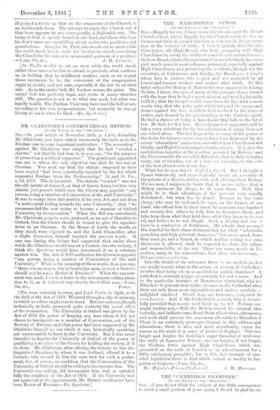MR. GLAD STONE'S CONTROVERSIAL METHOD.
[To THE EDITOR OF THE " SPECTATOR."]
Sin,—In your article of November 26th, p. 1,493, defending Mr. Gladstone, you have stated erroneously the facts as to the Ewelme case in some important particulars. "The accusation" against Mr. Gladstone was simply that he had "evaded a statute," not that he had done it, as you say, "for the purpose -of promoting a political supporter." The gentleman appointed was one to whom the only objection was that he was not an Oxonian. You next say that the statute supposed to have -been evaded "had been practically repealed by the Act which -separated Ewelme from the Professorship," 31 and 35 Vic., -c.-23, 1870. This is incorrect. The statute " evaded " was not -the old statute of James I., or that of Queen Anne, but this very -statute just passed, which says the Crown may appoint "any person, being a member of Convocation of the said University." It was to escape from this proviso of his own Act, and not from "a sentimental feeling towards his own University," that "he recommended the new rector to become a member of Oxford University by incorporation." When the Bill was introduced, Mr. Gla,dstone,proprio motif, proposed, as an act of liberality to -Oxford, that the Crown should be bound to give the appoint- ment to an Oxonian. In the House of Lords the words, as they stood, were objected to, and the Lord Chancellor, after a slight discussion, himself inserted the present words. If -any one during the debate had suggested that under these words Mr. Gladstone would import a Cantab. into the rectory, I -think the Spectator would have denounced it as a calumny against him. The Act of 1870 authorises the Crown to appoint: "any person, being a member of Convocation of the said University." What is the meaning of these words, if, as you say, ." there was no reason why a Cambridge man, or even a literate, should not be made Rector of Ewell:cm ?" When the appoint- ment was made, I wrote a letter to the newspapers calling atten- tion to it, as it followed very shortly the Collier case.—I am,
[We were certainly in error, and Lord Powis is right, as to the drift of the Act of 1870. We erred through a slip of memory, to which no editor ought ever to trust. But our memory, though technically at fault, preserved quite correctly the moral effect of the transaction. The University of Oxford was given by the Act of 1870 the power of keeping any man whom it did not choose to incorporate as a member of Convocation, out of the Rectory of Ewelme, and that power had been suggested by Mr. Gladstone himself as one which it was, historically speaking, not unreasonable to leave to the University. But it was never intended to deprive the University of Oxford of the power of qualifying a nominee of the Crown for holding the rectory, if it so chose. Mr. Gladstone, after offering the rectory to two dis- tinguished Oxonians by whom it was declined, offered it to a Cantab., who seemed to him the next best for such a prefer- ment, but, of course, on condition that the Convocation of the University of Oxford should be willing to incorporate him. The University was willing, did incorporate him, and so satisfied fully the condition of the Act of 1870. If the University had not approved of the appointment, Mr. Harvey could never have been Rector of Ewelme.—En. Spectator.] .






































 Previous page
Previous page